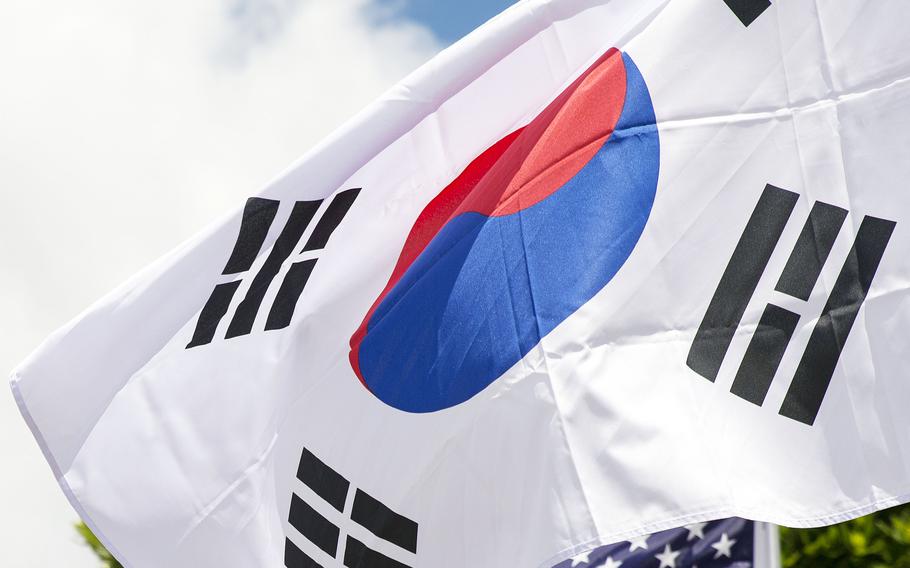Asia-Pacific
New cost-sharing deal takes effect for stationing US troops in South Korea
Stars and Stripes September 2, 2021

South Korea's Ministry of Defense is expected to ask the National Assembly for a 4.5% increase to this year’s overall defense budget of $43.7 billion. (U.S. Marine Corps)
CAMP HUMPHREYS, South Korea — South Korea will spend nearly $125 million more this year to station American troops on the peninsula, according to a new cost-sharing deal that took effect Wednesday.
The Special Measures Agreement between South Korea and the United States determines the cost split for keeping roughly 28,500 U.S. troops in the country and employing South Korean civilians on U.S. military bases.
Seoul is expected to contribute $1.02 billion for 2021, a 13.9% increase to the $896.62 million it spent the previous year. The renewed agreement will retroactively apply to South Korea’s contribution from last year, which was carried over from 2019 after negotiations for the agreement’s renewal became deadlocked during President Donald Trump’s administration.
Under the new six-year arrangement, Seoul’s future contributions will be proportional to its overall defense budget, which has risen in recent years. In the past, South Korea’s Special Measures Agreement contributions were determined separately.
The Ministry of Defense is expected to ask the National Assembly for a 4.5% increase to this year’s overall defense budget of $43.7 billion, according to local news reports. That will also increase South Korea’s contribution to the Special Measures Agreement.
Shin Beomchul, director of the Center for Diplomacy and Security at the Korea Research Institute for National Strategy, described the new agreement as “stable” and equitable for the time being.
“A majority of South Korean people support a strong alliance, so they agreed to increase the amount of budget,” Shin told Stars and Stripes on Thursday.
However, the agreement may become inequitable due to the new provision that connects the Special Agreement to the overall defense budget, Shin said.
“It should not depend on the annual defense budget, but on the annual price increase,” Shin said.
The ruling Democratic Party shared similar concerns, saying in a Tuesday statement that “synchronizing annual increase [rates] with the national defense budget could lead to excessive contributions.”
The “South Korean government must negotiate annual increase rates of the agreement aside from national defense budgets in coming negotiations,” the party’s statement said.
South Korea’s revised contribution is a modest increase from the estimated 13% hike Seoul initially offered the U.S. during negotiations last year, but far less than the amount sought by Trump. He described South Korea’s past contribution levels as “peanuts” and demanded that it spend as much as $5 billion to keep U.S. troops on the peninsula.
The State Department during Trump’s administration argued the U.S. “invests significant military resources” to maintain its presence in South Korea, namely, to deter threats from North Korea.
“Sustaining the costs of our global military presence is not a burden that should fall on the U.S. taxpayer alone but is a responsibility that should be shared fairly with allies and partners who benefit from our presence,” the department said in 2019.
South Korean lawmakers from the National Assembly overwhelmingly supported the deal in a 133-11 vote Tuesday afternoon.
Following the vote, the ruling Democratic Party issued a statement saying the two countries are “now in a position to manage the alliance with more stable manner, without any necessity of yearly renegotiations.”
“Unlike Trump administration’s inequitable requests to demand sharp increases in the past, two countries came up with relatively reasonable results,” the party’s statement said Tuesday.
South Korea’s Ministry of Foreign Affairs, in a separate statement Wednesday, said the new agreement “is expected to provide conditions for stable stationing of U.S. Forces Korea and greatly contribute to the enhancement of the … alliance.”
Some lawmakers, such as Justice Party leader Bae Jin Gyo, voiced their opposition to the agreement.
“The value of the [South Korea]-U.S. alliance would be damaged and only unequal … relations would be left,” Gyo said in a speech at the National Assembly on Tuesday. “We cannot, and must not, agree on the unreasonable demand that asks South Korea to raise its contribution, which is defense costs being used by the U.S. for the U.S.’s investments …”